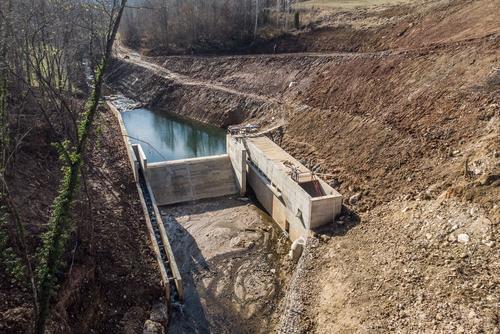EuroNatur and three other NGOs submit a complaint to the Energy Community against Serbia’s failure to fully assess the environmental impacts of small hydropower before their construction.

Dried-out riverbed, impassability for migratory species, destruction of the surrounding landscape: at the small hydro power plant Ravni na Pristavaci near the village of Uzice you can see all the negative consequences of hydropower.
© Amel EmricRadolfzell, Wien. Most of the rivers in Serbia are pristine and unspoilt. As such, these rivers form the basis of a highly biodiverse ecosystem that is unique in Europe. Residents of villages in close proximity to these rivers are still deeply connected to them as the rivers provide the villagers with basic needs to maintain their livelihoods.
However, these rivers are threatened by the possible construction of approximately 700 hydropower projects of around 1 MW energy capacity. Each of these small hydropower projects may have a significant impact on the rivers and the surrounding environment as well as the local inhabitants that depend on them.
Most small hydropower plants are run-off-river projects. For these types of dams, a small barrier, or weir, is needed to impound water enabling water to be diverted through pipes into the powerhouse downstream. The powerhouse can be located either a couple of meters or several kilometres downstream. This means that the hydropower plant will influence water quantity as well as the quality of the water between the barrier and the powerhouse downstream. During dry periods, there won’t be enough water to spill over the head of the barrier into the river. As a result, river stretches dry up, and freshwater species – if able to survive - are unable to overcome these dry stretches between dam and powerhouse.
Environmental groups RERI, Riverwatch, EuroNatur and ClientEarth have submitted an official complaint to the Energy Community in Vienna against the Serbian Government on the basis of its failure to assess the environmental impact of small hydropower plants. The four NGOs are raising concerns about how Serbia decides whether or not an Environmental Impact Assessment (EIA) is needed for small hydropower projects (<2 MW) prior to their development.
According to national legislation, the Serbian authorities are obliged to assess the environmental impact the plants will have. However, the environmental groups criticise the limited amount of criteria taken into account when taking this decision: only the size of the plant and in exceptional cases also its location in a protected area are considered when deciding whether the project requires to be put through the EIA procedure. In the NGOs’ opinion, all hydropower plants must be subjected to an EIA and the Serbian government must not grant a carte blanche to destroy Serbia’s precious ecosystems.
An EIA is necessary to either avoid and or minimise the effects on the environment as well on the local residents. The four NGOs hope that through this complaint, Serbia will comply with the legal framework under the Energy Community Treaty that would ensure a proper assessment of the impact on the environment of all hydropower projects, regardless of their size or location.
The environmental groups also hope that this complaint helps to curb the devastating boom of dam constructions in Serbia. The complaint seeks to improve the overall protection of these unique rivers in Europe as well the livelihoods of those dependent on them.
Background information:
- The Energy Community is an international organisation that aims at the integration of neighbouring EU countries to extend the EU internal energy market rules and principles in a legally binding framework.
- More information about the pristine rivers in the Balkans you can find here: https://balkanrivers.net/en


